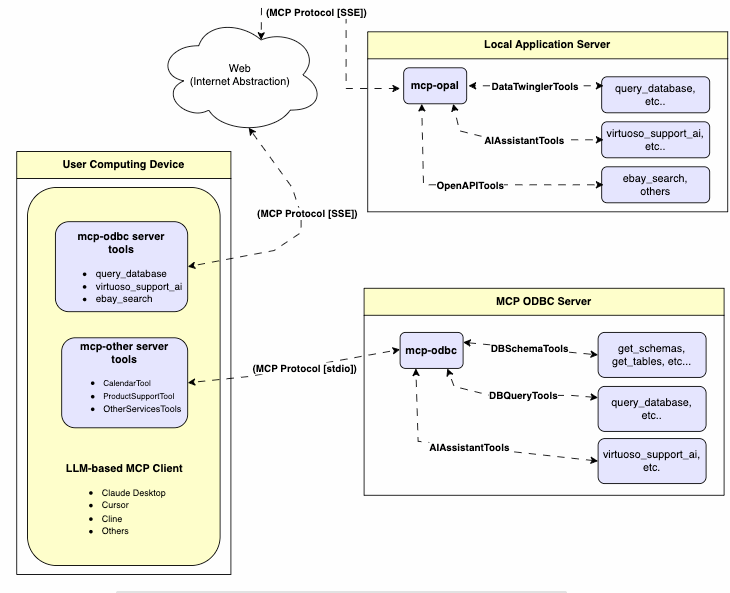About
A lightweight MCP server that exposes ODBC databases via FastAPI, enabling schema discovery, table listings, detailed table descriptions, and SQL execution with JSONL or Markdown outputs for quick integration into LLM-powered tools.
Capabilities

The OpenLink MCP Server for ODBC via PyODBC is a lightweight, FastAPI‑based bridge that lets AI assistants such as Claude query relational databases through the Model Context Protocol. It resolves a common pain point for developers: integrating arbitrary SQL backends into conversational agents without writing custom connectors or handling low‑level ODBC details. By exposing a consistent set of tools—schema discovery, table introspection, query execution, and even stored‑procedure support—the server turns any ODBC‑enabled database (Virtuoso, SQL Server, PostgreSQL, MySQL, etc.) into a first‑class data source for AI workflows.
At its core, the server translates MCP tool calls into standard ODBC operations. When a client invokes , the server queries the database catalog and returns all available schema names. The and tools provide fine‑grained metadata, including column types, nullability, and key constraints. These capabilities are invaluable when an AI assistant needs to understand the structure of a dataset before crafting queries or generating reports. The tool allows pattern‑based searching, which is especially useful in large databases with many tables.
Executing SQL is handled by two dedicated tools: /, which return results in JSONL format, and , which renders the same data as a Markdown table. The JSONL output is ideal for structured reasoning and further AI processing, while the Markdown variant feeds directly into conversational displays or lightweight dashboards. For Virtuoso users, and provide specialized support for SPARQL and the Virtuoso Support Assistant, extending the server’s utility beyond traditional relational queries.
Typical use cases include data‑driven business analytics, where an AI assistant can ask a user for high‑level insights and then pull the necessary tables or run ad‑hoc queries behind the scenes. It also fits well in data‑engineering pipelines, enabling LLMs to validate schema changes or generate migration scripts. Because the server operates over HTTP and adheres strictly to MCP, it can be deployed behind existing authentication mechanisms (API keys) and scaled with minimal overhead. Its ODBC foundation guarantees compatibility across a wide range of database engines, making it a versatile tool for developers who need to embed powerful data access into AI‑powered applications.
Related Servers
Netdata
Real‑time infrastructure monitoring for every metric, every second.
Awesome MCP Servers
Curated list of production-ready Model Context Protocol servers
JumpServer
Browser‑based, open‑source privileged access management
OpenTofu
Infrastructure as Code for secure, efficient cloud management
FastAPI-MCP
Expose FastAPI endpoints as MCP tools with built‑in auth
Pipedream MCP Server
Event‑driven integration platform for developers
Weekly Views
Server Health
Information
Explore More Servers
Unity MCP Server
Chat with Claude to build and organize Unity projects effortlessly
MCP Demo Server
Demonstrates Model Control Protocol in Python
Non Dirty MCP Server Restart
Restart Claude Desktop via Model Context Protocol
MCP Desktop DVR
AI‑powered screen capture and analysis on macOS
Polarsteps MCP Server
Access your Polarsteps travel data with AI
Tls Mcp Server
Secure MCP communication over TLS for cloud services